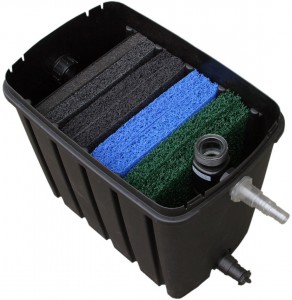Filtration is essential to the health of your pond, but I bet you already knew that! It may seem like its a no-brainer, but what kind of filtration do you need, exactly? Choosing which filter to use, and how much filtration you need is a personal choice, based on your pond’s specific needs. Today, we are going to break down the two main types of filtration and why it’s important to integrate them into your pond routine.
Mechanical filtration
It is what it sounds like. Mechanical filtration is going to be any device (skimmer, filter materials) that doesn’t interfere with the chemical make-up of your pond. The reason to use this type of filtration is to separate any physical debris or sludge from the water and hold on to it. This makes it easier on you, or whoever maintains your pond, when you want to make you pond look cleaner. I don’t mean to confuse you, your pond water will be cleaner when you use this type of filtration, but like I mentioned before, this kind of filtration won’t do anything to change the chemicals in your pond.
Biological filtration
I know what this looks like, a bigger, fancier version of a mechanical filter. Alas, I have fooled you! There is a very important aspect of bio-filters that set them apart from regular old mechanical filters; bacteria. Even though we are used to the word bacteria being thrown around in regards to our health (and usually in a more negative context), the bacteria that you find in these bio-filters are actually your friend. If you’ve read a lot of our other posts, or even if you haven’t, you might have heard of something called “Beneficial bacteria”. The bacteria would, in this case, live inside the filter material, eating up all the “undesirable” chemicals that naturally occur in your pond. You may be thinking to yourself “This is like an all-in-one package deal, what else could I possibly need?”, and if you are, I got you again! The thing is with all the good stuff in life is that it comes with some compromises. In order for the bacteria to work their magic, you need certain conditions (above 55 F, not having you water “over-cleaned” with something like chlorine) and you must have a mechanical filtration system in place for most bio-filters because if there is debris that goes through your bio-filter and gets caught in the filtration material, it will starve the good bacteria of their food source and oxygen. This isn’t a huge deal if its only a single piece of debris every so often, but without something like a skimmer, all of your debris will get filtered through the bio-filter, thus making it just a very large and very expensive skimmer.



